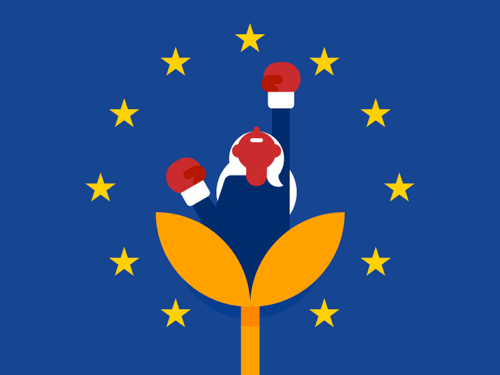Are job-searching platforms the new Tinder?
Jul 15, 2019
3 mins

Do gamification, making connections, and the algorithms that power finding matches hold the same potential to change the way we find and accept jobs that they did for finding and accepting dates?
With over 50 million users and 26 million matches per day, Tinder has revolutionised dating ever since it launched in 2012. If you see someone swiping away on their phone, whether it’s on the bus, at work or in the street, chances are they’re on Tinder. Its popularity makes sense: swiping (essentially window shopping for dates) is addictive and Tinder’s special algorithm and geo-targeting means you can match, organise and go on a date within the hour.
Tinder has made dating easier than ever, but matching people with similar interests can also be used for another tedious activity: job searching. With approximately 45% of all jobseekers searching for jobs daily on their phones, it has never been more important for employers to make their recruitment process mobile.
In 2015, fewer than 20% of companies deployed their HR solutions on mobile apps, but things have changed since then. Apps such as Blonk & Job Swipe have likened jobseekers to serial daters by replacing CVs and cover letters with profiles that, like Tinder, you can swipe yes or no to in the hopes of a match. If you struggle to sell yourself on paper (because we all know how hard it is to contain your genius in 140 characters or less), you can write a statement of motivation or submit a short video instead. Their algorithms act as matchmaker to find jobs that perfectly match your skills, experience and location, and anonymity lets you search whilst avoiding employers’ prying eyes. Employers and candidates can also chat directly on the app before arranging to meet up, much like organising a date on Tinder, but without the fear of being catfished.
These apps want people to learn to love job searching in the same way they did dating. But how successful are they?
There are some obvious problems. While job search apps try to appeal to as many people as possible, they mostly attract a younger crowd; despite an increasing number of Baby Boomers using their phones to look for jobs, Millennials and Gen Xers remain the most glued to their phones. The numbers don’t lie: 78% of Millennials and 73% of Gen Xers use their phones to hunt for jobs compared to only 57% of Baby Boomers. And, while it’s true that a larger proportion of jobseekers are millennials, the problem remains that these apps might not be accessible to everyone.
Another obstacle is getting enough people to form a sufficiently large matching pool. Job search apps are constantly fighting with established companies for users. The most popular job and employment brand, Indeed, receives around 250 million unique visitors every month, even without gimmicks like swiping or a matching algorithm. It also has a wider reach, with Indeed listing jobs inover 60 countries. Popular dating apps have also capitalised on their potential, as Tinder’s, Ripple & Bumble Bizz can be used to network with individuals, so that you can now find both dates and jobs with the same swipe. This fierce competition limits the quantity and quality of users that each app can attract, hindering the effectiveness of their algorithms. Since their matching formula relies on comparing data from similar users to learn what appeals to you, more competition equals less users—and less data for the app to learn from.
In truth, job search apps are only useful for certain types of occupations, roles and businesses. Jobs related to installation, maintenance, and repair as well as transportation have higher rates of mobile job searches (approx. 80%), compared to occupations in the business and finance sectors (approx. 57%). Considering the active lives of the workers within those industries, the popularity of mobility in a job search comes as no surprise. Such workers usually work from contract to contract, and since the recruitment process is shorter and the requirements are largely the same for each job, it’s easier for them to apply from their phones. Mobile job applications are best suited to shorter recruitment processes such as those of small businesses, and for more junior roles.
Another point to consider is how turning your job search into a game can impede it. With the profiles stacked up, you can’t browse through your suggested matches without swiping through them all, meaning your search could actually be more time consuming than normal. There is no option to filter the results either: instead, you have to blindly trust the app’s algorithm, which is not always effective. After all this, there is still no guarantee that a match is treated the same as applying for the job: many employers will still ask for a CV and/or cover letter after the initial match, in which case the app has offered little advantage.
It’s clear that job search apps can’t replace the recruitment process entirely. It might speed up the time it takes to match people to jobs of interest, but they do little to accelerate the process of actually getting the job. Such apps are most effective for hiring junior roles and for short-term work and small businesses, and chances are that if you’re using it, you’re a millennial.
Until they gain the trust of jobseekers and employers alike, job search apps, and particularly those that are gamified, are more effective as another listing board. For now, it seems the quick love affair between recruiter and candidate will have to wait.
Illustration: Eddie Stok

More inspiration: Employer branding

Is cultural add the new cultural fit?
A growing number of companies are swapping the question “What’s a good fit?” for “What’s missing?”
Jun 28, 2023

How to make your Glassdoor page an asset
50 million unique visitors flock to the Glassdoor social platform, making it the second most popular job site in the United States.
Feb 23, 2021

Recruitment marketing: the future of talent acquisition?
Recruitment marketing is the combination of digital technology and recruitment techniques to acquire high-quality talent.
Sep 16, 2019

How blockchain could transform the core of HR
Accelerate fundamental HR processes, secure payroll, verify candidate's informations ... what blockchain brings to HR.
Aug 12, 2019

The American Dream in Europe?
This study highlights a global reflection on the new challenges of the entrepreneurial culture in France and the ecosystem that accompanies it.
Aug 09, 2019
Inside the jungle: The HR newsletter
Studies, events, expert analysis, and solutions—every two weeks in your inbox

